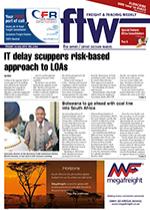Kenya’s ambassador to South Africa has made a strong stand for methodical implementation of the 55-state African Continental Free Trade Area (AfCTA). Speaking during the recent Manufacturing Indaba in Johannesburg, Jean Kamau identified a range of challenges facing the biggest single market – from non-tariff barriers and corruption to customsrelated cross-border holdups. In many instances, Kamau said, it came down to drawing from experience through some of the regional trading blocs that were already in place – the East African Community (EAC), SADC, the Common Market for Eastern and Southern Africa (Comesa), and related regional harmonisation bodies such as the Southern African Customs Union (Sacu). She stressed that “lessons learned at bilateral level could manifest at a multilateral level. “So it’s important that we endorse a global trade
agreement that resonates with where the continent has progressed to date and then use critical lessons from the sub-regional level to drive the agenda as a whole.” Referring to local building blocks as “quick wins” that can be scored on the way to carefully rolling out the wider area, Kamau said it was important to view historical hiccups as part of the natural progression towards establishing a single market. Successes and failures courtesy of regional integration should all be harnessed to establish a firm foothold for further free-trade progression to the north, west, and north-west of the continent, she said. A high-ranking public official herself, Kamau was also unashamedly frank about the role that politicians could play. “Political will is very
important. The EAC has actually been around for more than 40 years but at some point, because of political differences, it ceased to exist. “If we don’t allow our differences to derail our common interests and we get the negotiations off to the right start, it can spark the necessary economic development that we hope will give the necessary impetus to the private sector and deliver the results we’re hoping for.” Answering a question about what lessons the EAC had learned over the span of its own initially fraught, eventually successful history, Kamau remarked that member countries had agreed to forget about certain disagreements by “focusing on commonalities”. Apart from South Sudan which appears to be struggling with serious
growing pains ever since its independence from Sudan in 2011, the leading EAC members – Kenya, Uganda, Rwanda, Burundi and Tanzania – have forged ahead through powersharing agreements. Kamau added that Kenya, Uganda and Rwanda had even gone as far as enabling the free flow of citizens across the various borders. “People can come and go as they please, only needing their identity cards, not passports. We also launched a common visa, for example, so that businessmen from South Africa and elsewhere only need one work permit to operate in all three countries.” As Kenyan emissary, Kamau didn’t comment about tense standoffs between Rwanda and Uganda that have paralysed the two neighbouring countries’ busiest border of Gatuna-Katuna, causing havoc for imports, exports, as well as traders and ordinary human traffic passing between the two border towns. Lessons learned at bilateral level can manifest at a multilateral level. – Jean Kamau

